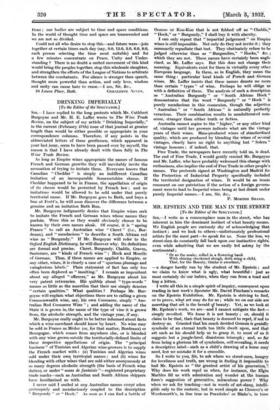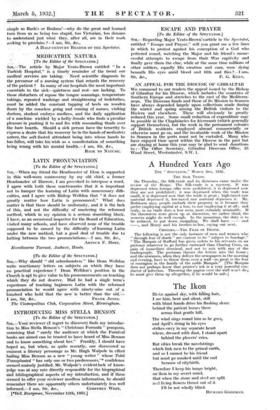MR. EPSTEIN AND THE MAN IN THE STREET
[To the Editor of the SPECTATOR.] Snr,—I write as a commonplace man in the street, who has inherent in him the dominant instinct of what beauty means. We English people are curiously shy of acknowledging that instinct ; and we look to others—unfortunately professional artists for the most part—to speak for us. None the less, 9 street-hien do constantly fall back upon our instinctive rights, even while admitting that we are easily led astray by the sentimental ;
"Or as the snake, rolled in a flowering bank With shining checkered slough, doth sting a child, That, for the Beauty, thinks it excellent,"
—a danger hardly run by the student of Mr. Epstein ; and we claim to khow what is ugly, what beautiful : just as most certainly do. our babies, when they run from a toad and hug a kitten.
• write all this in a simple spirit of inquiry, consequent upon reading in-last week's-Spectator Mr. David Fincham's remarks on the- Epstein Exhibition. Mr. Epstein is striving to find, or to prove, what art may do for us ; while we on our side are asserting that- art is the herald 4 beauty. Yet, as we look at Mr. Epstein's work, we are—and I cannot mitigate the fact— simply revolted. We know it is not beauty ; or, should it claim to be that, theii that beauty is doomed to repel, if not to destroy us. Granted that his much derided Genesis is grandly symbolic of an eternal truth too little dwelt upon, and that art such as his should help us to grasp it, to Most of US it suggests but a jungle-bred, disastrous triumph ; and, so fir' from being a glorious bit of symbolism, self-revealing; it needs a descriptive label—such as a child's drawing of a horse may
need, lest we mistake it for a crocodile. . .
So I write to you, Sir, to ask where we street-men, hungry for loveliness and truth, are Wrong in finding it impossible to hail Mr. Epstein as "the greatest artist of his generation. Why does his work repel us when, for instance, the Elgin Marbles fill us with admiration and wonder at the human form's suggestion of generative, miraculous power ? Why when we ask for teaching—not in words. of art-slang, intelli, gible only to the esoteric, but in word simple as Chaucer'ahr Wordsworth's, in line true as Praxiteles' or Blake's; in tone simple as Bach's or Brahrns'—why do the great and learned turn from us as being too stupid, too Victorian, too demure to understand just what they, after all, are in their work seeking to proclaim ?—I am, Sir, &c., A HALF-CENTURY READER OF TME Spectator.



















































 Previous page
Previous page